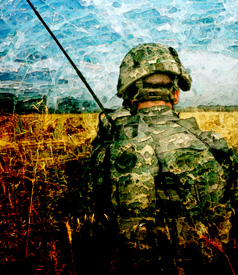by: Dahr Jamail, t r u t h o u t | Report
 (Image: Jared Rodriguez / t r u t h o u t; Adapted: The U.S. Army)
(Image: Jared Rodriguez / t r u t h o u t; Adapted: The U.S. Army)
US Army Specialist Lateef Al-Saraji, a decorated combat veteran, came back from the occupation of Iraq with severe post-traumatic stress disorder (PTSD).
Saraji joined the military because he wanted to serve his country. He served well as a linguist and translator working under secret clearance with military intelligence, according to a letter of recommendation written by his commander following his tour in Iraq, "This letter is to inform you of my endorsement of SPC Alsaraji's superlative performance and vital contributions to the command during our recent 15-month extended combat tour in Iraq." Saraji is also a three-year trustee with American Legion Post 42 in Gatesville, Texas.
PTSD is often routed in one event, but more often, with the two ongoing occupations, it is rooted in multiple traumatizing events. While in Iraq, Saraji was horrified by discovering headless bodies of suspected spies caught by the Iraqi resistance, which were thrown in a canal near the building where he was based "so we would see them. I still have nightmares over the bodies in the water, all blue and foul-smelling," he wrote of his experience.
When he got back to the US, it took him several months to get an appointment with a counselor on his base, who then referred him to an off-base psychiatrist, who diagnosed him with severe PTSD.
In an email to Chuck Luther, the founder and director of the Soldier's Advocacy Group of Disposable Warriors," Saraji wrote that he "felt that the Army did not care about me and my superiors did not seem to care. On July 1 [2009] the psychologist, Dr. Leach, wrote a letter recommending I have 2 weeks off."
Rather than his commander, Sgt. First Class Duncan, follow the recommendation of Dr. Leach, Saraji was accused of going absent without leave and told he would not be given the two weeks off, along with being written up.
"I got too depressed," Saraji wrote of his experience. "I thought everyone would be better with me dead. I was going to kill myself. I drank ¾ gallon of Bacardi 151, took some pills and was going to shoot myself. I was depressed and tired of the racism and prejudice that I was receiving. I was talking on the phone with the Chaplain and he heard me cock my gun."
Luckily, very shortly thereafter three officers appeared at his door and took him to nearby Fort Hood, where he was admitted to a psychiatric unit for a week. From there he was transferred to a facility in Wichita Falls, Texas, for three weeks, where he was jumped by five soldiers who harassed him and called him a "towel head" and "sand nigger." He was moved to a different floor of that hospital, but wrote, "I was afraid for my safety so I tried to run away from the hospital."
Saraji returned to Fort Hood, only to find Sergeant Duncan writing him up yet again. According to Saraji, when Sergeant Duncan learned Saraji had nearly attempted suicide, he coolly told Saraji that he should go kill himself.




No comments:
Post a Comment